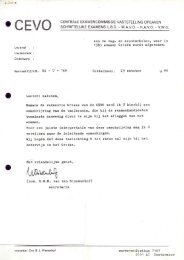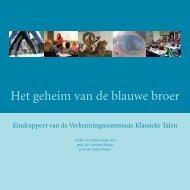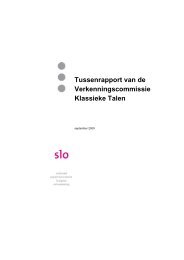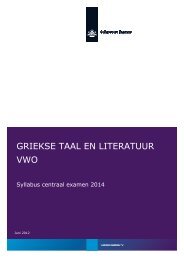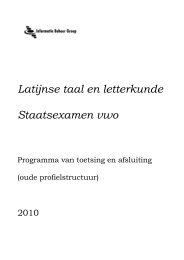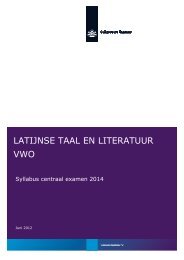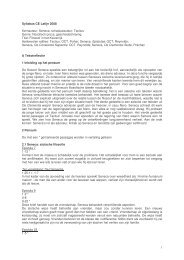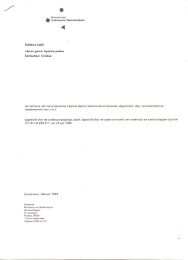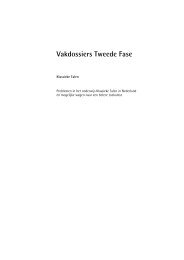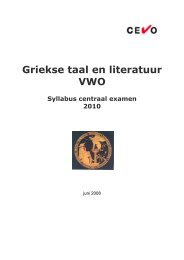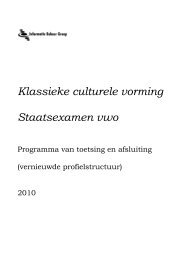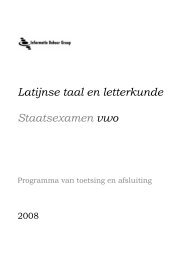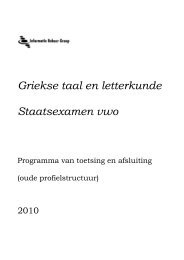Rome Wasn't Digitized in a Day - Council on Library and Information ...
Rome Wasn't Digitized in a Day - Council on Library and Information ...
Rome Wasn't Digitized in a Day - Council on Library and Information ...
You also want an ePaper? Increase the reach of your titles
YUMPU automatically turns print PDFs into web optimized ePapers that Google loves.
230<br />
This lack of deeper underst<strong>and</strong><str<strong>on</strong>g>in</str<strong>on</strong>g>g about the nature of humanities data raises complicated questi<strong>on</strong>s<br />
regard<str<strong>on</strong>g>in</str<strong>on</strong>g>g what type of data are produced, how data should be captured, <strong>and</strong> how data should be<br />
curated for reuse. Borgman also drew attenti<strong>on</strong> to Clifford Lynch’s dichotomy of data as raw material<br />
vs. <str<strong>on</strong>g>in</str<strong>on</strong>g>terpretati<strong>on</strong> (Lynch 2002), po<str<strong>on</strong>g>in</str<strong>on</strong>g>t<str<strong>on</strong>g>in</str<strong>on</strong>g>g out that it br<str<strong>on</strong>g>in</str<strong>on</strong>g>gs up two relevant issues for the digital<br />
humanities. First, raw material is far more likely to be curated then scholars’ <str<strong>on</strong>g>in</str<strong>on</strong>g>terpretati<strong>on</strong>s of<br />
materials, <strong>and</strong> while it may be the nature of humanities research to c<strong>on</strong>stantly re<str<strong>on</strong>g>in</str<strong>on</strong>g>terpret sources,<br />
“what is new is the necessity of mak<str<strong>on</strong>g>in</str<strong>on</strong>g>g explicit decisi<strong>on</strong>s about what survives for migrati<strong>on</strong> to new<br />
systems <strong>and</strong> formats.” Sec<strong>on</strong>d, humanities scholars usually have little c<strong>on</strong>trol over the <str<strong>on</strong>g>in</str<strong>on</strong>g>tellectual<br />
property rights of the sources they use (e.g., images of manuscripts, cuneiform tablets), a factor that<br />
can make data shar<str<strong>on</strong>g>in</str<strong>on</strong>g>g very complicated <str<strong>on</strong>g>in</str<strong>on</strong>g> the humanities.<br />
Another <str<strong>on</strong>g>in</str<strong>on</strong>g>terest<str<strong>on</strong>g>in</str<strong>on</strong>g>g comparis<strong>on</strong> between the data practices of those work<str<strong>on</strong>g>in</str<strong>on</strong>g>g <str<strong>on</strong>g>in</str<strong>on</strong>g> the digital humanities<br />
<strong>and</strong> those work<str<strong>on</strong>g>in</str<strong>on</strong>g>g <str<strong>on</strong>g>in</str<strong>on</strong>g> the sciences was offered by Edm<strong>on</strong>d <strong>and</strong> Schreibman (2010):<br />
If we apply a science paradigm, a digital humanities scholar could be compared to an<br />
experimental physicist, as some<strong>on</strong>e who designs processes <strong>and</strong> <str<strong>on</strong>g>in</str<strong>on</strong>g>struments to f<str<strong>on</strong>g>in</str<strong>on</strong>g>d the answers<br />
to their research questi<strong>on</strong>s. But the most strik<str<strong>on</strong>g>in</str<strong>on</strong>g>g difference between the experimental humanist<br />
<strong>and</strong> the experimental physicist lies <str<strong>on</strong>g>in</str<strong>on</strong>g> the fate of these processes <strong>and</strong> <str<strong>on</strong>g>in</str<strong>on</strong>g>struments after the<br />
article <strong>on</strong> the f<str<strong>on</strong>g>in</str<strong>on</strong>g>d<str<strong>on</strong>g>in</str<strong>on</strong>g>gs they enabled has been written: they are transcended, perhaps licensed to<br />
another for further use, perhaps simply discarded. Why are we so different about our electr<strong>on</strong>ic<br />
data Would it be enough for humanistic scholars as well to draw their c<strong>on</strong>clusi<strong>on</strong>s <strong>and</strong> let it go<br />
either to be developed by some<strong>on</strong>e else or to mildew Or is there someth<str<strong>on</strong>g>in</str<strong>on</strong>g>g <str<strong>on</strong>g>in</str<strong>on</strong>g>herently<br />
different <str<strong>on</strong>g>in</str<strong>on</strong>g> the nature of our data, that we should be so attached to its survival For example,<br />
we expect to receive credit for scholarly editi<strong>on</strong>s—why should we not receive it for digital<br />
scholarly editi<strong>on</strong>s Are the data collecti<strong>on</strong>s created by humanists <str<strong>on</strong>g>in</str<strong>on</strong>g>herently more accessible<br />
<strong>and</strong> open than an experimental physicist’s algorithm or shade-tree spectroscope (Edm<strong>on</strong>d <strong>and</strong><br />
Schreibman 2010)<br />
In additi<strong>on</strong> to the unique nature of humanities data, Edm<strong>on</strong>d <strong>and</strong> Schreibman agreed with Borgman<br />
that there were many challenges to data reuse even bey<strong>on</strong>d the frequently cited problem of <str<strong>on</strong>g>in</str<strong>on</strong>g>tellectual<br />
property rights. They stated that <strong>on</strong>ce a scholar’s colleagues <strong>and</strong> friends had looked at a digital project,<br />
the actual explorati<strong>on</strong> <strong>and</strong> reuse of digital project materials was typically very low. Edm<strong>on</strong>d <strong>and</strong><br />
Schreibman speculated that the organizati<strong>on</strong> of a digital data set or collecti<strong>on</strong> might appear to be too<br />
“powerful an act of editorialism” to many scholars for them to believe more orig<str<strong>on</strong>g>in</str<strong>on</strong>g>al <str<strong>on</strong>g>in</str<strong>on</strong>g>vestigati<strong>on</strong><br />
could be c<strong>on</strong>ducted with the same materials. They also suggested, however, that the lack of<br />
<str<strong>on</strong>g>in</str<strong>on</strong>g>frastructure to communicate about digital works may be greatly h<str<strong>on</strong>g>in</str<strong>on</strong>g>der<str<strong>on</strong>g>in</str<strong>on</strong>g>g their reuse. “Stripped of<br />
publishers’ lists, of their market<str<strong>on</strong>g>in</str<strong>on</strong>g>g channels <strong>and</strong> peer review <strong>and</strong> quality c<strong>on</strong>trol systems,” they<br />
w<strong>on</strong>dered, “are we fail<str<strong>on</strong>g>in</str<strong>on</strong>g>g the next generati<strong>on</strong> of scholars by creat<str<strong>on</strong>g>in</str<strong>on</strong>g>g too many resources <str<strong>on</strong>g>in</str<strong>on</strong>g> the wild”<br />
(Edm<strong>on</strong>d <strong>and</strong> Schreibman 2010).<br />
The lack of formal dissem<str<strong>on</strong>g>in</str<strong>on</strong>g>ati<strong>on</strong> <strong>and</strong> communicati<strong>on</strong> channels to promote digital resources is<br />
particularly problematic because of the sheer amount of potentially relevant (as well as irrelevant) data<br />
<strong>and</strong> tools that are available <strong>on</strong>l<str<strong>on</strong>g>in</str<strong>on</strong>g>e. While the challenges of this data deluge are often discussed,<br />
particularly <str<strong>on</strong>g>in</str<strong>on</strong>g> terms of e-science, Stuart Dunn has suggested that for the digital humanities a more apt<br />
term might be the “complexity deluge”:<br />
Driven by <str<strong>on</strong>g>in</str<strong>on</strong>g>creased availability of relatively cheap digitizati<strong>on</strong> technologies <strong>and</strong> the<br />
development of software tools that support both exist<str<strong>on</strong>g>in</str<strong>on</strong>g>g research tasks <strong>and</strong> wholly new <strong>on</strong>es,



